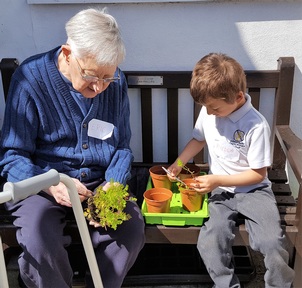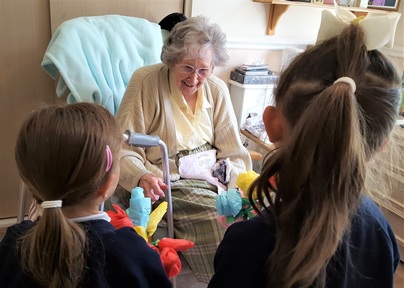School class in a care home: 'You don't feel old around children'
A care home in the Isle of Wight has set up a ‘class in a care home’ where young and old spanning ages from four to 94 learn together.

Residents from sit with the four and five-year-olds from Dover Park Primary School and take lessons in art, music and Makaton sign language.
A resident called Ron has even introduced the children to the V sign for victory telling them that it was ‘invented by a very great man called Winston Churchill during WWII’.
Ashley Barrier-Close, deputy manager of the home which is in Ryde, said: “The children visit every Friday. It is nice to see interaction and happiness and you can visibly see the growing connection between the two generations.
“It’s a win win for both the children and our residents, sharing activities and experiences. This improves health, learning and mutual understanding for all involved.”
The residents and school children have also been doing gardening together and story-telling.
Mr Barrier-Close added: “I have had the pleasure of getting involved in the gardening myself and it is nice to see intergenerational interaction being encouraged, especially for those with dementia. The children bring energy to the home which also benefits our residents and the feedback we have from them is very positive all round.”
The residents really enjoy the visits with one saying: “You don’t feel old when you are around children” and another commenting: “I get excited when Friday is near, as I know the children are coming”.

The project is being run by the charity Independent Arts and the care home is planning to set up a pen pal scheme once the project has finished in order for the connection to continue.
Kerry Tindall, workshops co-ordinator said: “Spending time with the elderly, children learn very early on to be accepting, tolerant and compassionate, all necessary skills for ensuring a caring, inclusive society. They can also be shown new perspectives, and benefit from the wisdom of so many years of lived experience.
“Similarly, the elderly who are often the most isolated in the community have the opportunity, once again, to play an extremely important developmental role, providing the stability and ballast that children need to feel secure and to develop confidence as they grow up.”
Latest News
 29-Jul-24
Dementia Bus gives carehome.co.uk staff insight into life with dementia
29-Jul-24
Dementia Bus gives carehome.co.uk staff insight into life with dementia
 01-Mar-24
Find out the top care homes in 2024
01-Mar-24
Find out the top care homes in 2024
 21-Mar-23
UK's top care homes in 2023 revealed
21-Mar-23
UK's top care homes in 2023 revealed
 03-Jan-23
carehome.co.uk launches free care helpline
03-Jan-23
carehome.co.uk launches free care helpline
 13-Dec-22
5 mins with Emily Whitehurst, chief operating officer for Constantia Healthcare
13-Dec-22
5 mins with Emily Whitehurst, chief operating officer for Constantia Healthcare